Are you a translator of Chinese into English? PEN Amreican needs your help. Contact PEN for more information: [email protected]
NewPages Blog
At the NewPages Blog readers and writers can catch up with their favorite literary and alternative magazines, independent and university presses, creative writing programs, and writing and literary events. Find new books, new issue announcements, contest winners, and so much more!
Chinese Translators Wanted
Spread the word!
Poetry Festival :: Geraldine R. Dodge 9.25-28
12th Geraldine R. Dodge Poetry Festival
Thursday, September 25 – Sunday, September 28, 2008
Waterloo Village in Stanhope, New Jersey
This biennial festival is the largest poetry event in North America, with this year’s event expecting 20,000. These four-day celebrations of poetry have been called “poetry heaven” by former U.S. Poet Laureate Robert Hass, “a new Woodstock” by the Christian Science Monitor, and simply “Wordstock” by The New York Times.
The Festival, held in even-numbered years since 1986, immerses audiences and nearly five dozen internationally acclaimed poets in readings, discussions, and conversations focusing on poetry. Events are held all day and evening in performance tents accommodating anywhere from 100 to over 2,000 people. During each day of the Festival, ten or more separate stages offer different activities simultaneously. The most recent Festival, in September of 2006, attracted a total audience of nearly 17,000.
An essential component of each Festival is a series of special programs for high school students (Sept. 25) and for teachers (Sept. 26)at all levels, elementary through college. More than 4,500 students and 2,000 teachers from throughout the country participate in conversations and readings designed specifically for them during the first two days of the Festival.
Admission is well within reason, with the most costly four-day pass topped at $78 (discounts at all levels for students!).
This year’s line-up includes Chris Abani, Coleman Barks, Taha Muhammad Ali, Coral Bracho, Billy Collins, Lucille Clifton, Mark Doty, Martín Espada, Joy Harjo, Robert Hass, Brenda Hillman, Edward Hirsch, Jane Hirshfield, Ted Kooser, Maxine Kumin, Naomi Shihab Nye, Sharon Olds, Linda Pastan, Charles Simic, C.D. Wright, Franz Wright and dozens of other accomplished poets, musicians and storytellers.
Spread the word!
NewPages Update :: August Book Reviews Posted
The NewPages Book Reviewers have been especially busy this last month with a unique selection of books. Stop by and check out these reviews:
The Withdrawal Method
Fiction by Pasha Malla
Anansi, 2008
Review by Matt Bell
Nylund the Sarcographer
Novel by Joyelle McSweeney
Tarpaulin Sky Press, October 2007
Review by Cynthia Reeser
Structure of the Embryonic Rat Brain
Poetry by Christopher Janke
Fence Books, March 2007
Review by Cyan James
Awesome
Novel by Jack Pendarvis
MacAdam/Cage, August 2008
Review by Matt Bell
Margarita, How Beautiful the Sea Novel by Sergio Ram
Spread the word!
‘Man Booker Dozen’ Announced
29 July 2008
The judges for the 2008 Man Booker Prize for Fiction have announced the longlist for this year’s prize. The longlist of 13 books, often referred to as the ‘Man Booker Dozen’, was chosen from 112 entries; 103 were submitted for the prize and nine were called in by the judges.
The titles are:
Aravind Adiga
The White Tiger
Gaynor Arnold
Girl in a Blue Dress
Sebastian Barry
The Secret Scripture
John Berger
From A to X
Michelle de Kretser
The Lost Dog
Amitav Ghosh
Sea of Poppies
Linda Grant
The Clothes on Their Backs
Mohammed Hanif
A Case of Exploding Mangoes
Philip Hensher
The Northern Clemency
Joseph O’Neill
Netherland
Salman Rushdie
The Enchantress of Florence
Tom Rob Smith
Child 44
Steve Toltz
A Fraction of the Whole
Spread the word!
Jobs :: Various
The MFA in Writing Program at the University of San Francisco invites applications for a tenure-track position in Creative Nonfiction at the Assistant Professor level to begin Fall 2008. Eve-Anne Doohan, Communication and Social Interaction Search Committee Chair. Apply online.
The Department of English of Wheaton College invites applications for a tenure-track position in Creative Writing – Creative Nonfiction. Dr. Sharon Coolidge, Chair. November 14.
New York Public Library – Editor. Under the direction of the Director for Publications, contributes to and manages the timely publication of the Library’s donor magazine, Bookmark and writes development-based materials in support of Development Office activities, including capital campaign pieces, membership brochures and membership pages of nypl.org.
Spread the word!
Artist in Residence :: Northwestern University 11.3
Northwestern University Department of English is seeking applications for an Artist in Residence, a two-year appointment, renewable for two additional three-year terms (total of eight years), to start September 2009.
This position is for a poet who meets four criteria: 1) significant creative publication, 2) critical expertise in poetry & prosody, 3) acquaintance with criticism & technical analysis in prose genres, as well as the ability to teach fiction or creative nonfiction reading-and-writing courses, 4) experience teaching both creative & literature courses in a curriculum with a strong reading & analytic component.
Cover letter should be specific about your involvement in 2), 3), & 4) & should include names of referees, at least one of whom can comment on teaching. Please send letter, c.v., & a writing sample of five poems not to exceed ten pages in total (no books or complete MSS at this time) by November 3 to: Mary Kinzie, Director of Creative Writing, Department of English, Northwestern University, Evanston, Illinois 60208.
Applications from women & members of minority groups are strongly encouraged.
Spread the word!
The Withdrawal Method
Pasha Malla’s debut collection The Withdrawal Method starts off with “The Slough,” a story divided into two parts. The first, a weirder, more fanciful tale, begins with the unnamed protagonist’s girlfriend announcing that she intends to shed her skin, like a snake, and emerge as someone completely new. He begins to imagine what this new woman might be like and what he might mean to her, leading up to an abrupt shift as the story stops, resets and restarts as a more realistic narrative about a young man named Pasha whose girlfriend Lee is dying of cancer. Continue reading “The Withdrawal Method”
Spread the word!
Nylund the Sarcographer
To understand the world through its surfaces is sarcography, according to the titular character of Joyelle McSweeney’s Nylund the Sarcographer. The term “sarcography” breaks down to mean “flesh writing,” and is somewhat expanded to include rain, reading, one’s children or the idea of them, the senses, possibly more. McSweeney does not marry poetic and prosaic language – rather, she brings them together in a collision of semi-fabulist writing. Chapter 1, “I’m a Lug,” begins, “What else could I be as I walked down the street but a sarcographer of raining. I had to build a cask around it, built like itself.” Continue reading “Nylund the Sarcographer”
Spread the word!
Structure of the Embryonic Rat Brain
Christopher Janke has published a pretty book of poems. That’s obvious from the cover of Structure of the Embryonic Rat Brain alone: a mauve and purple tangle of presumable neuronal matter brushed with green. Fence Books, always pleasing with its designs, has cut Janke’s book wider than it is long and interspersed his poems with eye-catching doodles. If you flip the pages fast while staring at the lower right-hand corner you’ll see a rat put through its paces. This book makes it clear from the beginning that it intends on giving tactile pleasure while stimulating your mind. Like those famous lab rats pressing levers for cocaine, this book wants to keep you turning its pages. Continue reading “Structure of the Embryonic Rat Brain”
Spread the word!
Awesome
In Jack Pendarvis’s novel Awesome, the titular character is, in the most literal way, larger than life. A giant among men, he starts the novel off by proclaiming his own magnificence: Continue reading “Awesome”
Spread the word!
Margarita, How Beautiful the Sea
The prolific Nicaraguan writer Sergio Ramírez is almost unknown in this country. Only a handful of his thirty or so books have been translated into English, and just two appear to be in print in the United States, including Margarita, How Beautiful the Sea, which won the Alfaguara Prize, a major Spanish literary award, a decade ago. Margarita, translated by Michael B. Miller, is an ambitious, sweeping and beguiling work whose action spans more than half a century. With its huge cast of poets, journalists, generals, intelligence agents, failed cotton barons, whiskey priests, dictators, and many others (a character list at the end of the book runs eight pages and contains 75 names), it is a Nicaraguan national epic. Continue reading “Margarita, How Beautiful the Sea”
Spread the word!
Praying at Coffee Shops
One indication that a book is worth reading is the number of notes made in the margins, and I ended up with quite a few scribblings all over the clean, short poems of Maureen A. Sherbondy. Praying at Coffee Shops, with the striking cover image of a Jew praying at the Wailing Wall, suggests it will be about the modern Jew finding her place in the world. While essentially true, the stark image of close-eyed prayer belies the nuance, humor, and worldliness that come through in these poems. Nowhere is this more clearly exemplified than the title poem, whose full name is “Praying at Coffee Shops in the South”: Continue reading “Praying at Coffee Shops”
Spread the word!
Shelter Half
In this collection of overlapping stories, Carol Bly explores a town of moral highs and lows, a town held together by a family bakery, the ecumenical choir, and a need for automotive transportation. Bly has created a snow-covered community surrounded by the dark northern forest and the mysterious bears that inhabit it and a story about the chemicals that can either scrub the town clean or sully its very name. Continue reading “Shelter Half”
Spread the word!
Hunger
This first paperback edition of Elise Blackwell’s debut novel Hunger comes five years after its original hardcover publication by Little, Brown in 2003, but the book has aged well, its short narrative seeming even more timely as it uses its historical setting as inspiration for an exploration of how our appetites at all times threaten to topple not only our personal morality but also our professional and political principles. Continue reading “Hunger”
Spread the word!
Spooky Action at a Distance
What to make of Spooky Action at a Distance? The title of Tom Noyes’s story collection borrows a phrase from Albert Einstein that described his feelings about a phenomenon in quantum mechanics where two particles separated by vast distances – say, millions of light years – become entangled, so that changing the state of one of the particles will instantaneously change the other. The father of relativity thought this was counterintuitive, he never fully accepted quantum mechanics as a system for understanding the microscopic world. Continue reading “Spooky Action at a Distance”
Spread the word!
Apologies Forthcoming
In “Feathers,” the third story in Xujun Eberlein’s debut story collection Apologies Forthcoming, a young Chinese girl named Sail is forced by her mother into subterfuge to keep her grandmother from finding out that Sail’s sister has been killed while away at school. The lie continues for years, forcing ever more elaborate fabrications from Sail: Continue reading “Apologies Forthcoming”
Spread the word!
Zines :: Delaine Derry Green’s MSD & NMSD
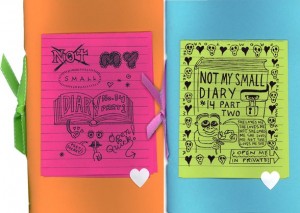 Thanks to Delaine for sending along recent issues of Not My Small Diary . What a great introduction to this comic zine – a compilation of artists tucked between the covers. Though NewPages lost its Zine Rack when Sean Stewart moved on, and we have tried several times to revive it, we still have a great personal interest in zine culture – some of the most indie of all publishing. If you’re not familiar with Delaine’s work, check out both MSD and NMSD.
Thanks to Delaine for sending along recent issues of Not My Small Diary . What a great introduction to this comic zine – a compilation of artists tucked between the covers. Though NewPages lost its Zine Rack when Sean Stewart moved on, and we have tried several times to revive it, we still have a great personal interest in zine culture – some of the most indie of all publishing. If you’re not familiar with Delaine’s work, check out both MSD and NMSD.
My Small Diary comics, by and about Delaine Derry Green, were initially created in 1993. The strips were initially sent for publication in such zines as The Brave New Tick and the White Buffalo Gazette. The first compilation of My Small Diary strips came out in 1995.
Not My Small Diary, a compilation of other artists’ auto-bio comics, was first released in 1996. Still going strong, these comic zines have attracted a diverse contributor base including artists such as Ed Repka, Andi Watson, Hilary Barta, Carrie McNinch, Missy Kulik, John Porcellino, Dave Kiersh, Brian Buniak, Raina Telgemeier, Ayun Halliday, Edward Bolman, Jeff Zenick, Ian Carney, Wil Kane, Dan Moynihan, Donna Barr and hundreds more. The first ten issues had an open autobiographical theme. Issue 11 had the theme of “childhood stories from age 11 & under” while issue 12 had the theme “after midnight – late night stories.” Issue 13 has the theme Lucky/Unlucky stories. Issue 14 is the “dating” issue.
Spread the word!
Google Lit Trips
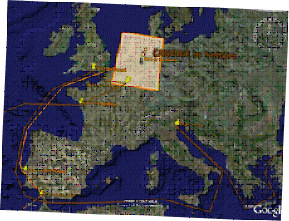 Okay, so maybe Google is making us stupid in some ways (though it doesn’t act alone…), but in others, I think it’s a wonderful TOOL for learning. The latest and greatest: Google Lit Trips. You have to download Google Earth first before you can open the .kmz files, but, once you do, such works as The Road, The Grapes of Wrath, The Kite Runner, The Aeneid, The Odyssey, Hana’s Suitcase, and The Sisterhood of the Traveling Pants are mapped out with notes.
Okay, so maybe Google is making us stupid in some ways (though it doesn’t act alone…), but in others, I think it’s a wonderful TOOL for learning. The latest and greatest: Google Lit Trips. You have to download Google Earth first before you can open the .kmz files, but, once you do, such works as The Road, The Grapes of Wrath, The Kite Runner, The Aeneid, The Odyssey, Hana’s Suitcase, and The Sisterhood of the Traveling Pants are mapped out with notes.
Books are divided into grade categories (K-5, 6-8, 9-12, HiEd), some come with slide shows as well as podcasts.
All of this is thanks to (besides Google) contributors who have provided the lit trips. More contributors are welcome, including teachers AND students! What a great class project this could make.
Spread the word!
New Lit on the Block :: The Broome Review
From Editor Andrei Guruianu: “The Broome Review is a new national literary magazine that seeks to bring further local and national exposure to the Broome County, NY arts community by attracting writers and artists of many genres from across the country and across the world. The journal promotes cultural development in and outside the immediate area through the creation of a wider audience for the works of established and emerging artists.”
The annual publication accepts submissions of poetry, fiction, creative nonfiction and art July-November of each year and currently is accepting works through November for the Stephen Dunn Prize in Poetry.
Authors included in Issue Number 1 whose works can also be found on The Broome Review website include Stephen Dunn, Timothy Liu, Katharyn Howd Machan, Carmen Firan, and Katherine Lien Chariott. Also available on the website is an artist gallery of works not found in the publication.
The Broome Review is also active in their community, in cooperation with The Center for Gender, Art & Culture, sponsoring several series of free creative writing workshops through the end of 2008. The workshops are led by magazine editors, and participants’ works will be considered for possible inclusion in a perfect-bound collection, titled Our Voices, to be published December 2008.
The Broome Review has really hit the ground running – c’mon everyone, catch up!
Spread the word!
Wordstock on the West Coast 11.7-9
 Wordstock 2008
Wordstock 2008
November 7-9, 2008
Oregon Convention Center
Portland, Oregon
Best known for the Book Fair, other events include a children’s festival, live wire radio show, literary feasts each night, and workshops. The 2007 roster included nearly 200 locally- and nationally-known authors.
Wordstock is expecting 15,000 attendees this year, and exhibit tables are still available.
Teachers! Wordstock for Teachers is for teachers of all grade levels. The one-day accredited writing workshop designed to provide teachers with hands-on strategies for the classroom as well as inspiration and tricks to improve their own writing. WFT will be held on Friday, November 7th.
Spread the word!
Residency :: Colorado Art Ranch
 Colorado Art Ranch and Art Works for the Heart of the Rockies will host five visual and literary artists near Salida Colorado. The residency Begins September 28, 2008 and ends October 30, 2008. Deadline for applications is August 1, 2008. Colorado Art Ranch and partners host 4+ visual and lieterary artists in different towns throughout Colorado. The residencies generally run four weeks. See their website for more information about ongoing opportunities.
Colorado Art Ranch and Art Works for the Heart of the Rockies will host five visual and literary artists near Salida Colorado. The residency Begins September 28, 2008 and ends October 30, 2008. Deadline for applications is August 1, 2008. Colorado Art Ranch and partners host 4+ visual and lieterary artists in different towns throughout Colorado. The residencies generally run four weeks. See their website for more information about ongoing opportunities.
Spread the word!
New Online Lit :: Post No Ills
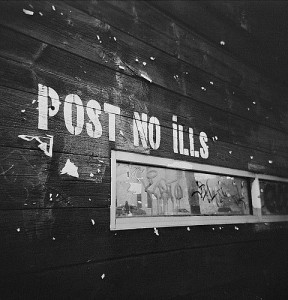 Editor Kyle G. Dargan, formerly of Callaloo, brings Post No Ills to the online and print lit scene, featuring book reviews, book review interviews (cool concept: reviewing a text via a dialogue between you and another writer/artists who has read the same book), author interviews, live event & exhibit reviews, art & photography, and creative written works.
Editor Kyle G. Dargan, formerly of Callaloo, brings Post No Ills to the online and print lit scene, featuring book reviews, book review interviews (cool concept: reviewing a text via a dialogue between you and another writer/artists who has read the same book), author interviews, live event & exhibit reviews, art & photography, and creative written works.
Already on the site is an interview with Abdel Shakur, editor emeritus of the Indiana Review, and a conversation between literary activist and D.C. icon E. Ethelbert Miller and literature scholar Keith D. Leonard. Uche Nduka’s work Eel on Reef is reviewed by Sarah Valentine, and Eve Dunbar reviews Other People’s Property: A Shadow History of Hip-Hop in White America by Jason Tanz.
The site is set up using a social network platform, so participation and conversation is encouraged. Post No Ills accepts submissions of certain works on a regular basis for online posting and will produce an annual “best of” print anthology.
Photo by Comtesse DeSpair – which inspired Post No Ills to accept other images of stencil artwork and photography for their section called “The Wall.”
Spread the word!
Toni Morrison Dedicates the First Bench by the Road
 Saturday, July 26, 2008, in Charleston, South Carolina, Toni Morrison dedicated the the first Bench by the Road. The Bench by the Road Project is a community outreach initiative of the Toni Morrison Society. It originates in Morrison’s remarks about Beloved in a 1989 interview: “There is no place you or I can go, to think about or not think about, to summon the presences of, or recollect the absences of slaves . . . There is no suitable memorial, or plaque, or wreath, or wall, or park, or skyscraper lobby. There’s no 300‐foot tower, there’s no small bench by the road. There is not even a tree scored, an initial that I can visit or you can visit in Charleston or Savannah or New York or Providence or better still on the banks of the Mississippi. And because such a place doesn’t exist . . . the book had to” (The World, 1989).
Saturday, July 26, 2008, in Charleston, South Carolina, Toni Morrison dedicated the the first Bench by the Road. The Bench by the Road Project is a community outreach initiative of the Toni Morrison Society. It originates in Morrison’s remarks about Beloved in a 1989 interview: “There is no place you or I can go, to think about or not think about, to summon the presences of, or recollect the absences of slaves . . . There is no suitable memorial, or plaque, or wreath, or wall, or park, or skyscraper lobby. There’s no 300‐foot tower, there’s no small bench by the road. There is not even a tree scored, an initial that I can visit or you can visit in Charleston or Savannah or New York or Providence or better still on the banks of the Mississippi. And because such a place doesn’t exist . . . the book had to” (The World, 1989).
‘Bench by the Road’ Tribute to Slaves
By Dottie Ashley (Contact)
The Post and Courier
Sunday, July 27, 2008
Carrying opened yellow umbrellas, a large crowd filled the dock Saturday at Fort Moultrie on Sullivan’s Island, swaying to the rhythm of the Adande Drummers.
On this humid day, more than 300 years after the first boat carrying newly enslaved Africans crossed the Atlantic Ocean and delivered its human cargo barely a mile away, the mood was upbeat but also bittersweet.
When strains of “Swing Low, Sweet Chariot” burst from the crowd, the melody set the stage for writer Toni Morrison, 77, the first black to win the Nobel Prize for Literature, to come forth and toss a wreath made of yellow daisies into the cove’s waters.
This was the Maafa ceremony in remembrance of those 60 million souls torn from their homeland and their loved ones, and brought into a life of pain and misery, and it was also for those who never made it.
As the wreath floated from sight, a black steel bench, a more tangible symbol of remembrance, was set in cement overlooking the cove in a ceremony called “The Bench by the Road.”
Placed and maintained by the National Park Service, the bench provides a place to sit and recall the travails of ancestors in a spot where 40 percent of all those who survived the Middle Passage set foot on the North American continent for the first time.
Both ceremonies were outreach programs of the Fifth Biennial Conference of the Toni Morrison Society, an international organization hosted by the College of Charleston for four days last week.
Read more and see video clips here.
Spread the word!
Ben Segal with No Record Press
Started in 2006 by “private donations,” No Record Press has already made splash in the lit world with its goal to be “an organization dedicated solely to publishing promising literary works by previously-unknown writers…new writers that, for various reasons, may find it difficult to interest mainstream publishers.”
There’s no question that Ben Segal would have found some difficulty getting his first book accepted in mainstream publishing: 78 STORIES: A CROSSWORD NOVELLA. This book is a giant fold-out with multiple puzzles and blocks of text (image from Diet Soap).
About the work: “As the price of oil skyrockets to heaven, NASA flights plummet back to earth, contemporary philosophy runs on dualistic fumes and the National Football League all but forbids end zone dance fiestas, you decided that humanity was officially out of good ideas. But you were thinking in terms of ‘left’ and ‘right.’ 78 Stories, unlike the vast majority of the Western hemisphere’s chirographic offerings, conceived of the world in terms of ‘across’ and ‘down.’ Challenging our core assumptions of textual linearity while tickling our funny bones, Ben Segal’s astonishingly original debut pirouettes from the Mayan Long Count, ghost/human romances, seedy Native American hotels, pie-creamed art critic, bears transfixed be cellular phone ringers, and much more. As in an American crossword puzzle, the text is readable in two directions.”
For more information about the work, visit No Record Press. Diet Soap has a brief review of the work with photos, and What to Wear During an Orange Alert posted an interview with Ben Segal.
Spread the word!
Awards :: Travis Holland Wins for First Novel
 Travis Holland wins VCU Cabell First Novelist Award
Travis Holland wins VCU Cabell First Novelist Award
PR via Tom Gresham
VCU Communications and Public Relations
7/23/2008
Travis Holland has won the VCU Cabell First Novelist Award honoring the best debut novel published in 2007 for The Archivist’s Story, his tale of a prison archivist in the Soviet Union shortly before World War II.
Holland will receive the award at the First Novelist Festival at Virginia Commonwealth University this November. Holland, a Michigan resident whose short stories have appeared in Glimmer Train, Five Points and Ploughshares, was one of three finalists for the prize, which is now in its seventh year. The other finalists were Jesse Ball for Samedi the Deafness and Joshua Harmon for Quinnehtukqut.
Read more on VCU’s website.
Spread the word!
Hey pal, can I bum a book?
 What’s Next – Roll Your Own Literature?
What’s Next – Roll Your Own Literature?
By Alison Morris
Publishers Weekly
July 24, 2008
“I’m really not quite sure what to make of this idea…. In 2007 the U.K.-based TankBooks published a series of classic books in small form – cigarette pack-sized form, to be exact – and packaged them in, essentially, cigarette packages. They called this series Books to Take Your Breath Away.'”
Read more on Publishers Weekly.
Spread the word!
Pulitzer Legacy in Georgia 10.27-30
 The Georgia Review announces The Pulitzer Legacy in Georgia program—a four-day celebration of fine writing and writers hosted by the Jekyll Island Club from October 27th to 30th, 2008. The event features four recent Pulitzer Prize winners, all of whom have an association with the state of Georgia, the University of Georgia, and/or The Georgia Review: poets Stephen Dunn and Natasha Trethewey, journalist and historian Hank Klibanoff, and historian Edward Larson.
The Georgia Review announces The Pulitzer Legacy in Georgia program—a four-day celebration of fine writing and writers hosted by the Jekyll Island Club from October 27th to 30th, 2008. The event features four recent Pulitzer Prize winners, all of whom have an association with the state of Georgia, the University of Georgia, and/or The Georgia Review: poets Stephen Dunn and Natasha Trethewey, journalist and historian Hank Klibanoff, and historian Edward Larson.
Each of these distinguished guests will participate in a variety of activities over the course of the week, including readings, panel discussions, question-and-answer sessions, and informal gatherings with attendees.
Registration for the event is open now and continues through early October or until capacity is reached.
For more information and to register for the program, contact the offices of The Georgia Review at (800) 542-3481 or [email protected]. Lodging reservations should be made through the Jekyll Island Club at (800) 535-9547.
Spread the word!
Pan African Literature :: Chimurenga Library
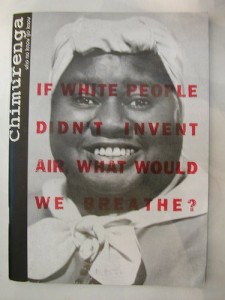 A fascinating and essential global resource of both past and present, reminding me that as the world gets smaller, it just keeps getting bigger. The following is from the Chimurenga Library site:
A fascinating and essential global resource of both past and present, reminding me that as the world gets smaller, it just keeps getting bigger. The following is from the Chimurenga Library site:
Curated by the editors and contributors of Chimurenga Magazine, the Chimurenga Library is an online archiving project that profiles independent pan African paper periodicals from around the world. It focuses on cultural and literary magazines, both living and extinct, which have been influential platforms for dissent and which have broadened the scope for print publishing on art, new writing and ideas in and about Africa.
The aim of the Chimurenga Library is not to produce a comprehensive bibliography of periodicals published in Africa; our approach is purely subjective. These are simply objects we read and admire, and which have in one form or another, influenced publishing and editorial choices at Chimurenga.
Some of these periodicals are deep in the postcolonial canon, others smaller and obscure, virtual even. All these projects built on the work of Drum, Presence Africaine, Transition, Black Orpheus and so on but are also alternatives to those monuments. It’s a sort of archipelago of counter-culture platforms that impacted on our concept of the paper-periodical, the publishable even.
The Chimurenga Library invites writers, readers and artists to share their personal experiences and perceptions of these and other periodicals through texts, films and multimedia works. Visitors to the Chimurenga Library can join the conversation but adding comments and updating information.
The Chimurenga Library is supported by Lettera27 and Pro-Helvetia and is part of the WikiAfrica Literature project.
Spread the word!
Michael Martone in upstreet 4
 Martone Fan Alert, from the upstreet blog: “upstreet number four, which is now on sale, features a 24-page interview with Michael Martone, the Indiana-born author of Michael Martone, Racing in Place, and many other works of experimental fiction and nonfiction.”
Martone Fan Alert, from the upstreet blog: “upstreet number four, which is now on sale, features a 24-page interview with Michael Martone, the Indiana-born author of Michael Martone, Racing in Place, and many other works of experimental fiction and nonfiction.”
Read more about upstreet here.
Spread the word!
Humor Times in the Classroom
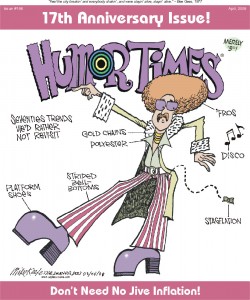 A great idea for Fall 2008 classes, especially considering the upcoming elections. Not only does Humor Times offer a hefty discount for classroom use (50 copies a month for apprx. $60 per semester), but there are also resources on their site for teachers. From the Humor Times website:
A great idea for Fall 2008 classes, especially considering the upcoming elections. Not only does Humor Times offer a hefty discount for classroom use (50 copies a month for apprx. $60 per semester), but there are also resources on their site for teachers. From the Humor Times website:
Using the Humor Times and Editorial Cartoons in the Classroom
Here’s a not-so-well kept secret many teachers have discovered: Editorial cartoons make great teaching aides! They are naturally entertaining, and therefore can be used to pique students’ interest in many subjects, including current events, government, history, social studies, etc. And as every teacher knows, getting a student’s attention is the first prerequisite for instructing them in any subject matter.
But getting them interested is just the first advantage of using editorial cartoons. They are also quite educating in their own right. Studying political cartoons will enable students to better understand the importance of current events. The cartoons may be used to help develop both factual knowledge and interpretive skills. Editorial cartoons can stimulate discussion and provide interesting writing topics.
Analyzing editorial cartoons helps to strengthen analytical and other higher-order thinking skills. Cartoons are used to convey not just political, but also social issues. Editorial cartoons can be used in a variety of ways, and can be integrated into any lesson plan. And best of all, students respond quite well to cartoons.
Spread the word!
Marge Piercy in Anderbo Online
It’s a made-up word, according to Rick Rofihe, Editor-in-Chief. Why? “I didn’t want to ruin an already existing word, so I tried to make up a new one. For example, it used to be that when you said ‘mustang’ people would think ‘horse.’ But now when you say, ‘mustang,’ people think you mean the car built by Ford.”
Far from ruining any word, even a made-up one, Rofihe and his staff (including June Eding, Jennifer Doerr, and Wayne Conti, in addition to over a dozen editors-at-large) have created a respected name in contemporary literature.
The online publication is built on an ongoing cycle of posting and is open for submissions of fiction, “fact”, poetry and photography.
The most recent additions to Anderbo include poetry by Marge Piercy, MRB Chelko, and Susan Peters, stories by Wayne Conti, Tom Cregan, and Cindy Jacobs, and a novel excerpt, “Boco Deli Days,” by Andre Medrano.
If you’re still sittin’ on the fence about online literary magazines, Anderbo would be a great first step. You’ve got nothing to lose, no words in your vocabulary to have tainted, and, if anything, you’ll gain a new word to share with your friends.
Spread the word!
Virtual Yard Sale :: Creative Nonfiction
EBay, Half.com – but never have I known anyone to offer a virtual Yard Sale – now, that’s creative!
Creative Nonfiction
First-Ever Yard Sale
July 21 – 28
Save up to 80% on back issues, books, merchandise, subscriptions, and more!
Spread the word!
Awards :: Glimmer Train New Writers :: July 2008
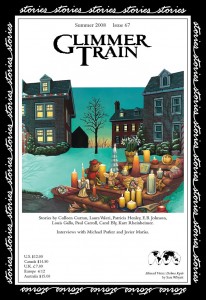 Glimmer Train has just chosen the three winning stories of their May Short Story Award for New Writers competition! This competition is held twice a year and is open to all themes fiction (500-12,000 words) for anyone who hasn’t had their work appear in a print publication with a circulation over 5000.
Glimmer Train has just chosen the three winning stories of their May Short Story Award for New Writers competition! This competition is held twice a year and is open to all themes fiction (500-12,000 words) for anyone who hasn’t had their work appear in a print publication with a circulation over 5000.
First place: John Walker of Cordova, Tennessee, wins $1200 for “Among the Least of These.” His story will be published in the Spring 2009 issue of Glimmer Train Stories.
Second place: Matthew Mercier of New York City, wins $500 for “Valentine Ave.” His story will also be published in an upcoming issue of Glimmer Train Stories, increasing his prize to $700.
Third place: Lisa Abramowicz, also of New York City, wins $300 for “Comings and Goings.”
Glimmer Train‘s Very Short Fiction competition will begin on August 1 for stories not exceeding 3000 words. Submissions online at www.glimmertrain.org.
Spread the word!
Matt Bell Wins the Million
Congratulations to NewPages Book Review Editor Matt Bell!
The voting for the storySouth Million Writers Award is now over and the winning story is “Alex Trebek Never Eats Fried Chicken” by Matt Bell (originally published in Storyglossia). Matt wins the overall prize of $300, which is provided thanks to the sponsorship of the Edit Red Writing Community. Second place goes to “Friday Afternoons on Bus 51” by Sruthi Thekkiam (Blackbird).
We’ll be coming to visit now, Matt – you’re buying!
Spread the word!
Submissions :: Poetry in a Box – Literally

Some calls for submissions just simply won’t fit on our CFS page and deserve their own blog post:
The Atlanta Poets Group is seeking proposals for work for the third issue of its magazine Spaltung. This issue will be packaged in the form of a box. They are looking for poem-objects. Pieces that address/embody the concept or experience of multiplicity/heterogeneity are encouraged.
*Please do not send work at this time.*
Instead, please send a proposal for the piece you propose to include to: [email protected]. Deadline for proposal submissions is September 31. Some parameters to consider in preparing your proposal:
–100 units of the magazine issue will be produced.
–We have not yet decided on the size of the box; in cubic inches it will likely be larger than a breadbox and significantly smaller than a moving crate.
–If your piece(s) require anything beyond mindless, cheap reporduction/assembly, we will likely look to you to provide us with 100 units, fully assembled.
–We are mostly looking for work that is beyond what can be accomplished on 8.5 x 11 inch paper and beyond what can be included on a CD-ROM.
–Proposals should include exact dimensions of the object(s) to be submitted.
You can familiarize yourself with past issues of Spaltung via the blog at www.spaltungmag.blogspot.com.
Spread the word!
What’s Your Inspiration? :: Opium Wants to Know
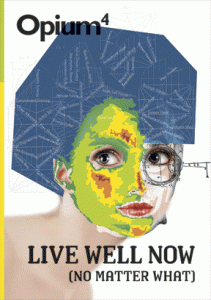 “Opium has a wildly ambitious idea that we want (need?) you to be a part of. We’re inviting every living writer to contribute. All we need from you: a quote told to you by another writer (in person, in email, overheard, while reading) that’s inspired or educated your work in some way. The goal is to create a sort of What I’ve Learned network. Details are here. Fire one over, pretty please, we have big ideas for this tiny project.”
“Opium has a wildly ambitious idea that we want (need?) you to be a part of. We’re inviting every living writer to contribute. All we need from you: a quote told to you by another writer (in person, in email, overheard, while reading) that’s inspired or educated your work in some way. The goal is to create a sort of What I’ve Learned network. Details are here. Fire one over, pretty please, we have big ideas for this tiny project.”
Spread the word!
Poet Laureate #16 :: Kay Ryan
 Thursday, July 17, the Library of Congress appointed Kay Ryan as the Library’s 16th Poet Laureate Consultant in Poetry for 2008-2009.
Thursday, July 17, the Library of Congress appointed Kay Ryan as the Library’s 16th Poet Laureate Consultant in Poetry for 2008-2009.
Notable Quote: “If there is a [literary] game of sorts, you can win by staying home and doing the writing,” Ryan says. “Good work can make its way in this culture.”
Ryan’s poems and essays have appeared in The New Yorker, The Atlantic, Poetry, The Yale Review, Paris Review, The American Scholar, The Threepenny Review, Parnassus, and more.
Read more about Ryan and the appointment here.
Spread the word!
Kenyon Review Online Gets Sassy(er)
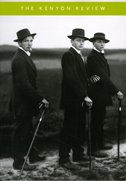 From Kenyon Review Editor David Lynn:
From Kenyon Review Editor David Lynn:
Kenyon Review Online will be a lively and innovative bridge between the world of the very best print literature and the emerging potential of the electronic universe. We’ll be offering innovative and delightful stories, poems, essays, memoirs, and reviews online. They will be renewed and refreshed regularly and then collected into electronic “issues” over time.
By and large, pieces appearing electronically will be distinct from work in the printed version of The Kenyon Review. I like to think of those pages as timeless. After all, readers turn to them for pleasure and enlightenment years and even decades after they first appear.
KR Online, however, will definitely be more timely, published more quickly than we’re able to do with print. And the pieces here will also be a little more experimental, a little more “out there.” Who knows?—maybe a little sassier too.
Of course, despite a new flavor, all the great writing on KRO will be held to the same high standards and expectations as The Kenyon Review. They’ll be considered as carefully, copyedited to our exacting standards. This will truly be the best writing from around the world, brought to you in this exciting new medium. After all, it’s our name, our tradition, our reputation on the line as well.
Online now: Read Bonnie Jo Campbell’s “Boar Taint” and Kevin Young’s “I Shall be Released” from the Summer 2008 issue of KR. Read new poetry from Christian Ward, an essay on poet Thom Gunn by Alfred Corn, a review of Daniel Hall’s Under Sleep by Janet Chalmers, and a review of Sarah Manguso’s The Two Kinds of Decay: A Memoir by Daniel Torday.
Spread the word!
Internships :: Lilith
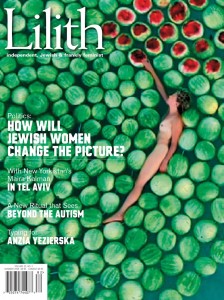 LILITH Magazine
LILITH Magazine
Independent, Jewish & Frankly Feminist
Lilith offers summer and semester-long internships to college students and recent graduates. Summer interns are expected to commit to at least two days per week in Lilith’s New York office. School-year internships may vary in their weekly commitment.
Some school credit may be available for a Lilith internship, which includes supervision by senior staff, participation in all editorial meetings, and routine office work relating to the assignment and editing of articles, preparing copy for the designer and printer, covering news of Jewish and feminist interest, ordering books for review, tracking manuscripts, and more. (Plus excellent snacks and good company.)
Spread the word!
Sinful Reader :: Bechdel Comes Clean
 This special comic of Dykes to Watch Out For by Alison Bechdel appeared in the 100th issue of Entertainment Weekly, where her memoir Fun Home was listed as number 68 of “new classic” books from the past 25 years. The strip begins:
This special comic of Dykes to Watch Out For by Alison Bechdel appeared in the 100th issue of Entertainment Weekly, where her memoir Fun Home was listed as number 68 of “new classic” books from the past 25 years. The strip begins:
Authors, bless me for I have sinned.
It’s been three months since my last novel. And I didn’t even finish that one.
For my penance I swear I’ll finally read something by Joyce Carol Oates and John Updike…
For fans who weren’t able to find a copy of the magazine, Bechdel received permission to reprint the strip on her site. Read it in full here. No doubt some of you will identify with the situation – I know I did!
Spread the word!
Question of Funding for Lit Mags
Susan of Rock and Sling recently wrote to inform me that they will be suspending publication of the magazine due to funding issues. As an independent non-profit, Rock and Sling is not alone in this struggle.
Susan writes: “Over the last few months we have been trying not to make the hard decision to suspend publication of Rock & Sling — pending procurement of long-term sustainable funding (tell me there is such a thing!). The problem of finances for independent presses runs deep. Without university backing to absorb some of the costs, the independent press must put an inordinate amount of time and energy into finding funding. We have found ourselves without sufficient partners and subscriptions alone haven’t proved to be enough. Suspending publication will allow our (all volunteer) staff to spend their time in the donations, grants, and endowments world more effectively.
“It seems a shame to have gotten this far and feel like we have established a niche for ourselves, only to have to stop production and turn all attention to finding support. I suppose any business major would have seen it coming from the get-go. Perhaps on your blog you can throw out the question of how independent presses can maintain financial stability. Where they can find funding—is govt. funding the answer? How does a journal like Rock & Sling (with a Christian bent to its content) get past the hyper vigilance of separation of church and state? Clearly we don’t want to be under any denomination—so church monies are not to be had.”
Susan also humorously added that it should be the law that writers who submit to lit mags should have to subscribe to at least one (another ongoing issue…). But, are subscriptions even enough in this day of increased postal rates and overall higher costs?
Any comments/advice? I’m sure this is an issue of concern for many. And, I already know what some will say – that even publications with university affiliation are not guarnteed funding. So, where does the money come from?
Spread the word!
New Press Seeks Poetry
Tilt Press in North Carolina is looking to print three chapbooks a year and is currently open for submissions (July 1 – Sept 30, 2008). No strangers to verse, editors Rachel Mallino and Nicole Cartwright Denison have joined together in this venture to support as yet unpublished poets. For more information, visit the Tilt Press website.
Spread the word!
Lit Mag Start-up Advice
From blogger Noel P. Mariano of The Acadmic Masochist: I went to school for this?
So you want to start your own magazine?
I had been kicking around the idea of starting up my own online literary journal. One of the graduates of the masters program that I’m in had started one up and it’s become very successful garnering some nominations for the Pushcart as well as other awards including Best of the Web.
I sat [and] talked to him about some of the advice and some of the things he considered when starting and here’s what Niel had to say…
Read the blog post on The Academic Masochist.
Spread the word!
Holocaust Memoirs Wanted
Appeal for Previously Unpublished or Unavailable Memoirs by Survivors of the Shoah
Worldwide Shoah Memoirs Collection
The Conference on Jewish Material Claims Against Germany (Claims Conference) has launched a worldwide appeal to Jewish survivors of the Holocaust and their families to submit previously unpublished or unavailable memoirs to a worldwide electronic collection.
This collection is being established in cooperation with Yad Vashem, the United States Holocaust Memorial Museum, the M
Spread the word!
Duffer Sighting :: Chicago Lit Examiner
 Long-time supporter of and intermittent review writer for NewPages (when he’s not doing a hundred other things!), Rob Duffer has embarked on a new endeavor: “I’m the Chicago Literary Scene Examiner.”
Long-time supporter of and intermittent review writer for NewPages (when he’s not doing a hundred other things!), Rob Duffer has embarked on a new endeavor: “I’m the Chicago Literary Scene Examiner.”
Rob explains:
Examiner is a community news source with ‘examiners’ giving the low-down on a specific scene. Examiner has expanded into 60 cities with over 6 million users. Dave Clapper, founder and editor of SmokeLong Quarterly, is the Seattle Lit Examiner. Its Chicago market is only two months old. It’s new, I’m newer, and I’m trying to get people involved.
My intention is to make the site a comprehensive resource of everything literary going on in and around Chicago. Promoting events; featuring authors, editors, agents, lit journals, presses, reading series; interviewing literary folk; reporting lit news; suggesting writing prompts or playing local lit trivia—pretty much anything to do with the written word in Chicago.
So what can you get out of it? Exposure. Promotion. Tapping into a growing network of sometimes disparate literary groups. One place to get reliable literary news in Chicago and nationwide.
The first author to be featured on Examiner will be Stephanie Kuehnert.
Send me your news, put me on your newsletter, add me to your RSS feed, forward this message to anyone who wants another venue to promote their writing. Check out the site. Email me at [email protected]
Spread the word!
VOTE TODAY! 2008 Million Writers Award
Today is the last day to cast your vote in the storySouth 2008 Million Writers Award. The top tens stories have been selected, and reader votes will determine the #1 online story of the year!
Top Ten Stories of 2007:
“Do Not Hate Them Very Much” by Matthew M. Quick (Agni)
“Friday Afternoons on Bus 51” by Sruthi Thekkiam (Blackbird)
“Postcards from my Brother” by Paul Yoon (Memorious)
“We Never Talk About My Brother” by Peter S. Beagle (Orson Scott Card’s Intergalactic Medicine Show)
“The Ethical Dilemma of a Sandwich Down the Pants” by Kelly Shriver (Pindeldyboz)
“The Hide” by Liz Williams (Strange Horizons)
“Alex Trebek Never Eats Fried Chicken” by Matt Bell (Storyglossia)
“Grinder” by X.J. Kennedy (StoryQuarterly) Note: free registration required to read this story.
“The Surgeon’s Tale” by Cat Rambo and Jeff VanderMeer (Subterranean)
“News About Yourself” by Scott Wolven (Thuglit)
Spread the word!
Submissions Page Updated July 17
Heads up for blog readers – a day’s advance notice! Visit the NewPages Calls for Submissions page for new listings. Sponsor listings are at the top of the page; scroll down to see all others. Expired listings removed regularly. For listing consideration, please e-mail information and/or website link to: [email protected]
Spread the word!
Cadillac Cicatrix California Fire Response
FOR IMMEDIATE RELEASE, July 17, 2008
Dear Friends …
I write to you with an update on the third issue of Cadillac Cicatrix and with news about our recent evacuation due to the encroachment of wildfires upon our office.
As some of you know, the recent spread of California wildfires has been difficult and exhausting for many communities and fire fighters. Our office has been threatened for the past two months by not only one fire but now a second, more serious fire.
On Saturday, July 12, we were persuasively evacuated from our offices because The Basin Complex Fire had come within potential striking distance of the community where we are located. The Basin Complex is the same fire that threatened Big Sur two weeks ago and has since moved northeast toward Carmel Valley through the Ventana Wilderness.
The fire is currently less than a comfortable distance from the Cadillac Cicatrix office and moving ever closer.
This being said, we are optimistic about the outcome, and we are attempting to move forward with our project (now from a satellite location) but it has been difficult – we are in a state of resolute plodding. Our intentions are to continue as we have for the past two years, but many of our files are currently in a tenuous location and it is uncertain when we might be able to access them.
Depending on the weather, the ability of thousands of fire fighters, as well as military and federal authorities, we could be back in our offices within a few weeks. If the worst does come to pass … well, I’d rather not think about it.
In the spirit of good communication, we only wish to inform you of our current situation and that the release of our third issue (in print any way) has been somewhat delayed.
The entire content of the issue – a focus on ADAPTATION – is available free online at www.CadillacCicatrix.org. We invite you to enjoy the very many talented writers and artists who have contributed to this issue, released July 1.
I look forward to sending you a more positive update soon and thank you for your continued support of our project.
Sincerely,
Benjamin Spencer
Executive Editor
CADILLACCICATRIX
www.CadillacCicatrix.org
21800 Parrot Ranch Road
Carmel Valley, CA 93924
[email protected]
Spread the word!
Mag Mailbag July 17
After a couple weeks of “host issues,” I am finally able to update the site!
Stop by NewPages Magazine Stand to find publisher descriptions and cover art from our sponsor magazines, and a list of all new issues of other literary magazines received here at NewPages World Headquarters.
Trying something new once again, this page will combine print and online lit mags.
The alternative magazines page has also been recently updated, but as we aren’t getting a lot of these coming through NPWHQ, and visitor traffic to this page is discouraging low, this may be the last time this page is updated. (Unless there’s some huge public outcry opposed to its elimination…)
If you’d like to be listed, as well as considered for review, be sure we get a copy of your publication (see our FAQ page for more information). For online lit mags, you only need to e-mail notification of when you have a new issue posted online: denisehill-at-newpages.com
Spread the word!
NewPages Update :: New Listings :: July 2008
More great finds added to the NewPages ranks. Welcome aboard – give ’em a click!
When viewing our guides, if you know of any links (mags, publishers, bookstores, record labels, etc.) you would like us to consider, please write to me: denisehill-at-newpages.com and send me a link.
New Online Lit Mags Listed
Parlor Journal
Shelf Life
CellA’s Round Trip
Road Runner Haiku Journal
Pregnant Moon Poetry Review
New Print Lit Mags Listed
Low Rent
Two Review
Packingtown Review
Oval
Illuminations
Ocho
MiPOesias
New Online Alt Mags Listed
Is Greater Than
New Print Alt Mags Listed
Penguin Eggs
Ode Magazine
Good Magazine
Alternatives
Whole Terrain
Our Truths/Neustras Verdades
Social Policy
The Last Straw
Permaculture Activist
New Publishers Listed
Green Candy Press
Firebrand Books
